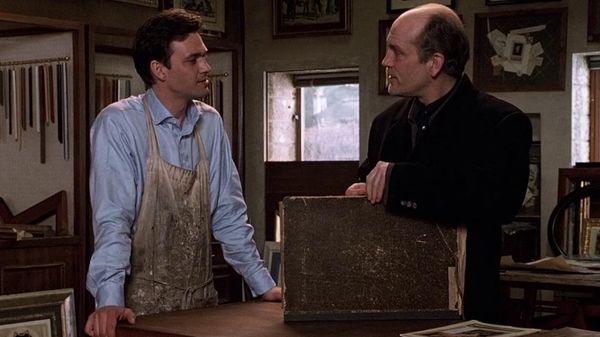Eye For Film >> Movies >> Ripley's Game (2002) Film Review
Ripley's Game
Reviewed by: Jennie Kermode

Anthony Minghella's The Talented Mr Ripley was always going to be a hard act to follow, and this later Patricia Highsmith adaptation, though the plot is less complex, is in many ways a more difficult story to get right.
In these circumstances, Liliana Cavani has done a superb job. John Malkovich is perfectly cast as the eponymous sociopath, but this is as much Dougray Scott's film; his portrayal of Jonathan, a family man with chronic myeloid leukaemia who is struggling to live in more ways than one, reveals new depths to his talent, yet his freshness and apparent innocence reflect the vulnerability of Ripley's previous obsessions. Ray Winstone rounds out the cast playing the same character he always does, but works well in context.

Whilst this is very much a male-centered film, Lena Headey turns in a powerful performance as Jonathan's wife, creating a sense of balance and normality against which other events are contrasted. These other events involve the murder of a Russian gangster in Berlin, with predictable (though never tiresome) complications ensuing.
The interesting thing about this film is the battle it engages with audience sympathies. Jonathan is not the usual pitiful and noble dying man; indeed, at times his complexity and energy can make one forget all about his illness, which serves the audience the same temptation he is facing as a character, inviting us to consider what it is that attracts people to violence.
During the first part of the film, the emotional focus hinges almost entirely on his performance. Very early on, we see Ripley offended after he is referred to as a "vulgar American", but many viewers may miss the significance of this, failing to understand why it hurts that seemingly impassive man so much. Ripley has spent the past two decades building up wealth, collecting antiques, and endeavouring to create for himself the kind of lifestyle which might have impressed those who dismissed him in the past, yet he seems doomed never to be considered good enough.
The irony is that, in the end, this would seem to be less to do with his origins and more to do with the very personality he has cultivated in order to acquire that lifestyle. This personality - his distance and apparent failure to engage emotionally - makes him hard to like. The film must tread a very fine line to maintain audience interest in him, and by and large it succeeds. Superb use of sound (including new music by Ennio Morricone) and some striking visuals help us to focus on the world as Ripley sees it, observing how he has substituted beauty for emotion. In this regard, Ripley's Game is everything Hannibal failed to be. But Ripley's tragedy, which gradually becomes apparent during the latter part of the film, is that he is not a man who has been troubled because he doesn't have a conscience, but a man still troubled because he does.
Ripley's Game is a beautifully realised portrait of two men facing different emotional challenges as they endeavour to interact with the world. One of the most moving and intelligent films this year.
Reviewed on: 27 Jun 2007



















